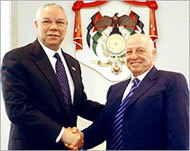US: No Palestinian state likely by 2005
It is “increasingly unlikely” that a Palestinian state will be created by 2005 as envisaged by a US-backed peace plan, the US State Department said.

State Department spokesman Richard Boucher blamed three factors on Monday for what he regarded as the diminishing chances of making the 2005 deadline: continued violence, the Palestinian Authority’s alleged “failure” to stop attacks against Israelis and difficulties in restarting stalled negotiations.
Boucher was responding to a question about whether possible new Israeli elections and Friday’s World Court ruling that a barrier Israel is building through the West Bank was illegal might make the deadline harder to reach.
“I think we’d already said well before any of these events occurred that it was … increasingly unlikely that we would be able to make the 2005 date,” Boucher said.
Such a reversal in US official position is likely to anger Palestinians and aggravate the already tense political and military situation, analysts warned.
US policy contradiction
Boucher’s comments, however, seem to contradict pledges made by US Secretary of State Colin Powell when he met Palestinian Prime Minister Ahmad Quraya at the World Economic Forum in Jordan last May.
 |
|
Powell and Quraya saw a need |
“We will take risks, risks that may be controversial when you see what we do from time to time … but we will take those risks and we will endure the controversy when we think it is in the cause of peace,” said Powell of the need to create a Palestinian state.
“From now until 2005, we have enough time to finish the negotiations and to have a Palestinian state according to President Bush’s vision,” Quraya said at the time.
International pressure
In recent weeks, Israeli authorities have come under increasing pressure to amend their policies regarding the separation barrier.
“I think the decision of the court is clear,” UN Secretary General Kofi Annan told reporters in Bangkok, where he is attending a world AIDS conference.
“Whilst we all accept the government of Israel has a responsibility, and indeed the duty to protect its citizens, any action it takes has to be in conformity with international law and has to respect the interest of the Palestinians,” Annan said, urging Israel to accept the World Court’s ruling.
But Israeli Prime Minister Ariel Sharon rejected outright any acceptance of the court’s ruling.
“The state of Israel totally rejects the opinion of the World Court,” Sharon said in his first public reaction to the advisory judgment.